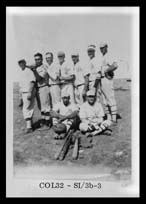Details
Collection: 00032 Digitized Images from Collection
Title: North Dakota Oral History Project Photograph Collection
Date: 1880-1977
Summary: Consists of copies of photographs belonging to people interviewed for the North Dakota Oral History Project. The Project was undertaken by Larry Sprunk, with the cooperation of the North Dakota American Revolution Bicentennial Commission, the North Dakota Farmers Union, and the State Historical Society of North Dakota. The primary objective of the North Dakota Oral History Project was to conduct oral tape recorded interviews with North Dakotans who lived through the state's history and who could speak of this history from a first-hand basis. Interviewees were photographed at the time of their interviews. In addition, the project borrowed over 6,000 historical photographs which were copied and added to the State Historical Society's collection. Many interviewees also donated family histories, documents, letters, ledgers, books, and artifacts.
Enter a subject or term in one or both of the “Search” boxes.
- “Item Detail” searches the Title, Creator and Summary fields of all item-level records.
- “Collection Number” searches the Collection Number field only and requires an exact match.
The “DETAILS” button provides additional information about an item, as well as the following options:
- “Collection Summary” details the contents of the entire collection in which the selected item is located.
- You can print the image and its corresponding details by selecting “Print".
- “Digitized Images from the Collection” returns a list of all digitized items within that collection (available from the “Collection Summary” screen).
Click on image to expand/zoom the image view.
“Photobook home” takes you back to the main Photobook page where you can start a new search.
“Featured Collections” showcases new and/or popular collections and the digitized images within those collections.
Information on how to order copies is located here.
The collections preserved in the North Dakota State Archives include over a million images. Only a small percentage of these images have been digitized. This photo gallery provides a preview of the images that have been digitized.
For more information on the non-digitized images, please refer to the finding aids found on our website at history.nd.gov, or ask a member of our reference staff for assistance.


